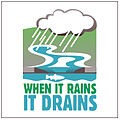Municipal Stormwater Management Plan (MSWMP)
Ordinance 2024-08 Stormwater Control
Stormwater Pollution Prevention Plan
Pet Waste Ordinance
Prohibit the Feeding of Unconfined Wildlife on Oldmans Township Property
Litter Control Ordinance
Improper Disposal of Waste
Containerized Yard Waste
Private Storm Drain Inlet Retrofitting
Illicit Connections to Municipal Storm Sewer System
Tree Removal
Municipal Operated Stormwater Mapping:
Freed Road & Cherry Street
Helen & Lerro
Lennox Run
Kay Gardens
Pollution Prevention Flyer
Helping the Environment and Oldmans Township
Solutions to Stormwater Pollution:
Water from rain and melting snow that flows over lawns, parking lots and streets is known as stormwater runoff. This water, which travels along gutters, into catch basins and through storm drain pipes and ditches, usually is not treated, but then flows or is discharged into local water bodies. Along the way, the storm water picks up trash (fast-food wrappers, cigarette butts, Styrofoam cups, etc.) and toxins and other pollutants (gas, motor oil, antifreeze, fertilizers, pesticides and pet droppings). This polluted stormwater can kill fish and other wildlife, destroy wildlife habitat, contaminate drinking water sources and force the closing of beaches because of health threats to swimmers. Human activity is largely responsible for the stormwater pollution. Everything that we put on the ground or into the storm drain can end up in our water. Each of us has a responsibility to make sure these contaminants stat out of our water.
- Limit your use of fertilizers and pesticides. Do a soil test to see if you need fertilizer. Do not apply fertilizers if heavy rain is predicted. Look into alternatives for pesticides.
- Properly use and dispose of hazardous products. Hazardous products include some household or commercial cleaning products, lawn and garden care products, motor oil, antifreeze and paint. Do not pour hazardous products down a storm drain because storm drains are usually connected to local water bodies and the water is not treated. Recycle used motor oil. Use natural or less toxic alternatives when possible.
- Keep pollution out of storm drains. Do not let sewage or other waste flow into a stormwater system.
- Position sprinklers so only the lawn is watered, not the driveway, sidewalk, etc.)
- Clean up after your pet. Pet owners must pick up and properly dispose of pet waste dropped on public or other people’s property. Use newspaper, bags or pooper scoopers to pick up wastes. Dispose of wrapped pet waste in the trash. Never discard pet waste in a storm drain.
- Don’t litter. Place litter in trash receptacles. Participate in community cleanups.
- Place cigarette butts in ashtrays or trash containers, not on the street. Empty automobile ashtrays into the trash, not out your car window or directly on the ground. Proper disposal will help keep waterways clean and minimize the risk of fire.
- Dispose of yard waste properly. Keep leaves and grass out of storm drains. Use leaves and grass clippings as a resource for compost.
- Use a commercial car wash. Commercial car washes recycle their wastewater and some also treat it before it is sent into the sewer system. If you do wash your car at home, use a bucket or a nozzle that you can turn off so the hose isn’t running the entire time and wash your car on the lawn so the extra water soaks into the ground. Use cleaners sparingly.
- It is unlawful to connect any pipe or device to the storm water system that is intended to discard, spill or dump any material other than storm water runoff or groundwater (sump pumps) into the system. This is to prevent pollution and contamination of waterways which receive discharge from our storm sewers.learn more about the solution to stormwater pollution, please go to http://www.cleanwaternj.org

